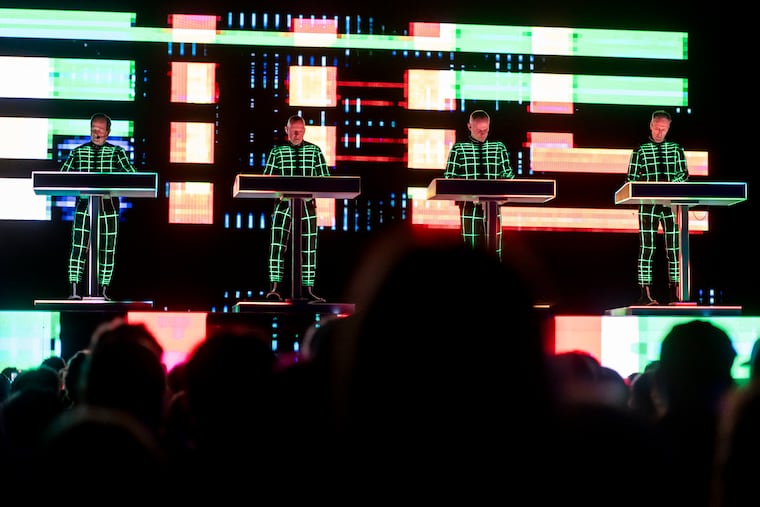Kraftwerk’s Philly show was a terrific, neon-lit kinetic experience
The influential German electronic band played Franklin Music Hall in celebration of the 50th anniversary of 'Autobahn,' its classic album.

Kraftwerk has always been ahead of its time, but when the pioneering German electronic music band arrived at Franklin Music Hall on Thursday to kick off a North American tour in celebration of the 50th anniversary of their classic album, Autobahn, they were a year late.
That’s because Autobahn, which broke the band, founded by Ralf Hütter and Florian Schneider, through to an American audience, and became profoundly influential on machine-made pop music recorded in its wake, came out in 1974.
Never mind that inexact detail, though, because Kraftwerk’s music remains timeless — and also eerily timely.
Long before the AI threat to eliminate human labor on a grand scale became frighteningly real or romantic connections were made by swiping right on a mobile device, Kraftwerk was singing about “The Man-Machine,” and “Computer Love,” while exploring the ways in which our gleeful embrace of technology turns each of us into a “semi-human beings.”
As ever, Kraftwerk, portrayed themselves as automatons on Thursday night at the sold-out venue, a building whose industrial setting as a former General Electric switchboard plant (before it became the Electric Factory in 1995) seemed particularly appropriate given the mechanistic nature of the music.
On what is dubbed their “Multi-Media Tour,” the four band members were led by Hütter, who sang his electronically altered vocals into a headset microphone in English, German, and French, while his comrades Henning Schmitz, Falk Grieffenhagen, and Georg Bongartz stood to his left.
Schneider, who formed the band with Hütter in 1970 after the two met while studying classical music in Düsseldorf, left the band in 2008 and died in 2020.
The original Kraftwerk vision — inspired in part by British visual artists Gilbert and George, who wore suits and ties and made experimental art — was to bring the avant garde into the mainstream, melding radical-at-the-time ideas about making music entirely with machines with the humdrum packaging of everyday life.
Part of the fun of a Kraftwerk show is feeling the throbbing bass and kinetic rhythm course through the room while the bobbing heads in the audience watch the four dudes on stage wearing retro-futurish, lit-up jumpsuits stand behind lecterns doing … what exactly?
Programming the music in real time, is the answer. An irony of the live Kraftwerk experience is that — in no small part, a result of their influence — so much of the in-concert pop presentation isn’t actually “live.” Instead, it involves prerecorded backing tracks and pitch-altering vocal manipulation if not outright lip syncing. But on stage, Kraftwerk brings its mechanistic music to life by recreating it onstage, working drum machines and sequencers, and playing synthesizers.
Kraftwerk’s music is Important with a capital I because albums like Autobahn and successors such as 1976′s Trans-Europe Express and 1981′s Computer World represent a key cultural juncture in 20th century pop music. The best and most frequently cited example of this is “Planet Rock,” the 1982 track by Afrika Bambaataa & the Soulsonic Force, shaped by Kraftwerk’s “Numbers” and “Trans Global Express,” that became a foundational building block in the rise of hip-hop as a global force.
But beyond the history lessons, a Kraftwerk show is, first and foremost, fun. Yes, the band members are static figures on stage, though if you watch them carefully, you can sometimes spy them tapping their feet, even as Hütter proclaims: “We are the robots.” And while everything else in the room is moving.
Thursday’s show was an entirely kinetic experience. Kraftwerk’s songs are almost always about forward motion. There’s “Autobahn,” of course, which was disappointingly the one track accompanied by a lame video, with a cartoon Volkswagen Beetle scooting up and down a highway. All of the rest of the visual presentation was imaginative, from the old school black-and-white bike racing clips in “Tour de France,” or the creepy android alter egos looming on a screen in “Robots.”
All computer-generated imagery was sleek and minimalistic, employed with a kitschy cleverness and abiding sense of humor. The show looked fantastic.
The real secret to Kraftwerk’s electronic music success is that for all of their sci-fi and experimental tendencies, their songs are catchy and often quite short. Two hours of motorik music included 18 distinct pieces, several of which were medleys or mashups of multiple songs. Kraftwerk doesn’t drone on and on like many of the EDM acts it influenced; they just grab you and go.
Stage patter is not a Kraftwerk speciality. Hütter said precisely two words to the audience, delivered as he held his hand over his heart, bathed in an appreciative ovation at the show’s close: “auf Wiedersehen.”
That tight-lipped approach to showmanship left the Philly audience to seek alternative ways to express its ardor. The crowd seized an opportunity during “Radioactivity,” a 1975 song that turned into an antinuclear power protest on a 1991 remix. The song has its educational aspect.
“Radioactivity, in the air for you and me,” Hütter sang. “Radioactivity, discovered by Madame Curie.” But it also name-checks locales of nuclear accidents, including Three Mile Island, site of a reactor meltdown in Dauphin County in 1979.
When the song came around to that roll call of shame — “Chernobyl, Harrisburg, Sellafield, Fukushima” — the words to the song were imprinted on the video screens, and the crowd erupted in cheers at the mention of the near disaster that put Pennsylvania’s state capital on the global map. Thank you, Kraftwerk for including us. We feel seen.